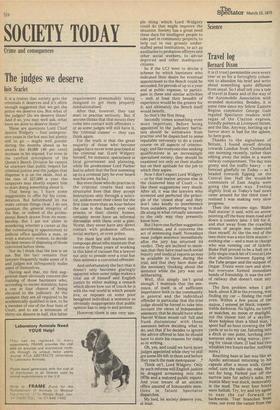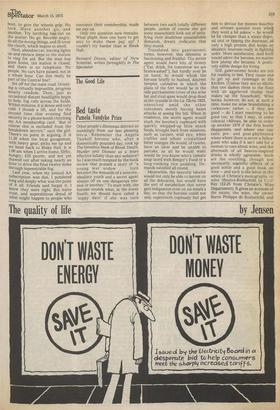Science
Travel log
Bernard Dixon
It is (I trust) permissible once every year or so for a fortnightly columnist to abandon his brief and write about something quite different from usual. So I shall tell you a tale of travel in Essex and of the way of the Automobile Association with stranded motorists. Besides, it is some time since my fellow Eastern Region commuter George Gale regaled Spectator readers with sagas of the Clacton express, friendly porters at Liverpool Street, and the like. Anyway, bottling up a horror story is bad for the spleen. So here goes.
Thanks to the signalmen of Britain, I found myself driving towards London from Chelmsford one morning recently, rather than editing away the miles in a warm railway compartment. The day was grotty and the traffic heavy — as forecast gleefully on Today — as headed towards Epping on the Central line. Half the would-be commuters of East Anglia were going the same way. Feeling slightly livid as Today's bad news came around for the third time I realised I was making very slow progress.
Then the welcome sign. 'Blake Hall station' it said, with an arrow pointing off the busy main road and down a country lane. I fell for it, and shot away from the crawling stream of people less observant than myself. At the the end of the lane there was a nice little station — nothing else — and a man in charge who was running out of tickets. Blake Hall proved to be a halt on a 'jolly single-track bit of Central Line that shuttles between Epping on the Tube proper and the outpost of Ongar. Trains were rare and slow, but everyone formed immediate bonds of friendship. It was the sort of railway that doesn't exist any more.
The first problem when I got back, about 8.30 in the evening, was finding my car — finding the road even. Within a few paces of the station, I entered jet black, impenetrable darkness. No lights, no torch or matches, no moon or starlight, not the tiniest hint of a skyline. More helpless than a blind man, I spent half art hour covering the 100 yards or so to my car, faltering into a ditch at one point, lurching into someone else's wing mirror, craving for visual clues. (I had had two whiskies two hours earlier, nothing more.) Reaching base at last was like an Apollo astronaut returning to his capsule after a moon walk. Great relief, turn the radio on, relax. But not for long. Parked just off the narrow lane for safety's sake, my Austin Maxi was stuck, immovably in the mud. The next four hours were hellish. Try, try and try again to ease the car forward or backwards. Tear branches from trees, use even the carpet from the boot, to give the wheels grip. No luck. Have another go, and another. Try lurching he out on the starter: No go. Become angry, do all the wrong things, and ill-treat the clutch, which begins to smell. Next, abandon car, leaving lights on and retrace steps to the station to ring for aid. But the man has gone home, the station is closed, and there is no telephone. No people. No cars have passed, not in a whole hour. Can this really be part of the Central line?
Set off for the main road. Orienting is virtually impossible, progress mostly random. Then, just as occasional distant headlights begin to help, fog rolls across the fields. Within minutes, it is dense and very cold. I thumb a lift, and for the second time that evening find security in a phone booth clutching my AA membership card. "But of course this is excluded from the breakdown service," says the girl. There's no point in arguing. It is 11.30 when the local garageman, With heavy gear, picks me up and we head back to Blake Hall. It is 1.00 am when I arrive home, filthy, hungry, £10 poorer, and not yet thawed out after taking nearly an hour to drive the final twelve miles through inpenetrable fog. Last year, when my annual AA subscription was due, I pondered long and deeply what was the point Of it all. Friends said forget it. I knew they were right. But naive trust, and superstitious dread of what might happen to people who renounce their membership, made me pay up.
Only one question now remains. What plight does one have to get into to make them pay up? I couldn't try harder than at Bleak Hall.
Bernard Dixon, editor of New Scientist, writes fortnightly in The Spectator



































 Previous page
Previous page